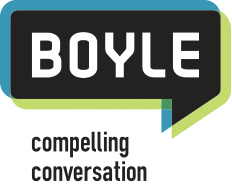Bite the Bullet: The Case for the Business Blog Part I
You may not subscribe to any blogs, but there’s a good chance that you read some bit of news, information or opinion from a blog every week.
Blogs appear when you search online for information, open a link from a social media post, click on a news alert or download an article from an electronic newsletter. In fact, you can count on them popping up
Blogs Have Become Primary Channels of Communication
Yes, blogs are content, but they also are content delivery mechanisms. They send out information from websites, then bring readers (aka potential customers) back to those websites. In this way, blogs are a form of inbound marketing, or a strategy whereby businesses “get found” and “bring customers in,” according to Trust Media and Forbes.
These industry leaders say that inbound marketing, including blogging, “involves creating and providing valuable content for your customers, promoting your remarkable content, building customer relationships and overall ‘pulling’ the customer toward you. Inbound marketing strategies create brand awareness, help establish credibility, create thought leadership, improve search engine optimization, develop valuable customer relationships and build trustworthy reputations.”
Clearly, consumers have “gotten the memo” about inbound marketing and blogging in particular. Consider:
- 80 percent of consumers identify themselves as blog readers
- 61 percent of consumers who shop online say they have made a purchase specifically because of a recommendation they read on a blog
- Business-to-business companies that blog regularly generate nearly 70 percent more leads than those that don’t (showing that they were successful at “getting found” and luring customers to them)
Although generating business – through new customers and repeat customers – is the fundamental goal of inbound marketing, a business owner who blogs stands to derive other benefits from the practice, too. In this way, blogging is not a linear process; it becomes a recursive process, enabling a business owner to burnish his reputation, enhance his brand and, in the end, engender the patronage of loyal customers who will speak highly of and recommend him and his products or services to others. And this portends only a profitable outcome.
Benefits of Blogging
Specifically, blogging allows a business owner to:
-
Establish himself as an expert and thought leader in his field – arguably the goal of any solid marketing effort. When people view a business owner as a go-to source for reliable information, they usually end up going to him for business purposes, too.
-
Build his company brand by communicating his story, his way. In this way, a blog becomes an authoritative and powerful tool, both in developing a company history and serving as an ongoing public relations vehicle.
-
Communicate – and even boast about – the company and the brand. By showcasing products and services, informing and educating and sharing company news and even employee pictures, a blog can become a means to build personal relationships with customers.
-
Learn about customers’ wants and needs: what they like, what they don’t like and what they’d like to see. Such insights can be a literal gold mine, alerting a business so that it can respond accordingly.
-
Forge an even closer bond with customers by opening the blog to customer submissions – both stories and photos. This is a pivotal leap for people to take, for they go from regarding a business as a simple purveyor of goods or services to someone with whom they want to share information.
-
Provide collateral for a sales team and, really, everybody on the company team who serves as a brand ambassador. When the content for a blog is chosen carefully and written well, it becomes an important, if not vital, communication tool.
-
Elevate the company’s ranking on the serve engines, which now scan actively for original, quality content – and reward the company with greater traffic.
This last benefit is an example of the “hard” benefits of blogging that can be tracked, counted and numerically evaluated. Read more about the quantifiable benefits of blogging in Bite the Bullet, Part II.
